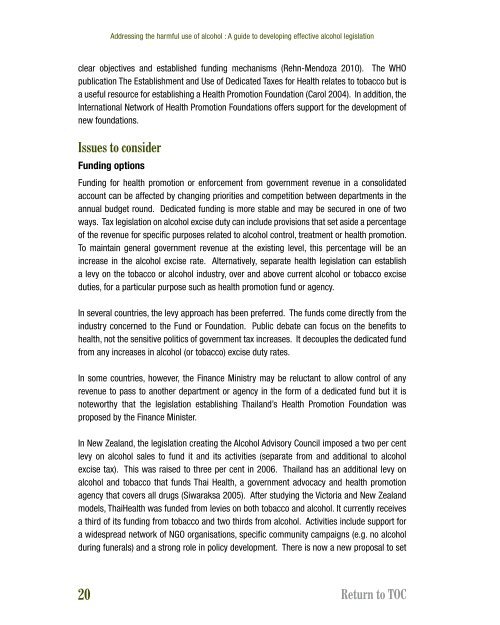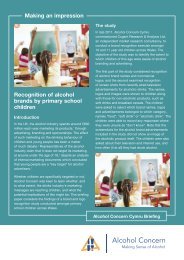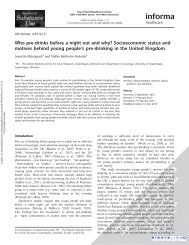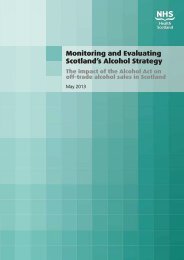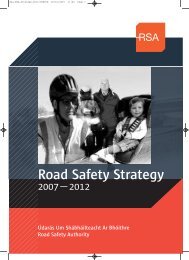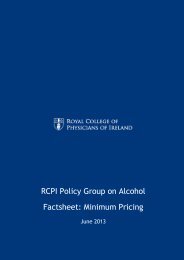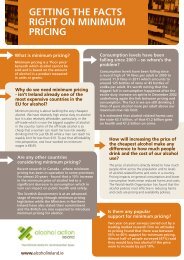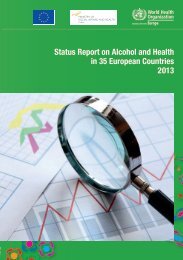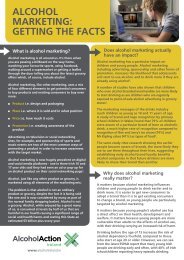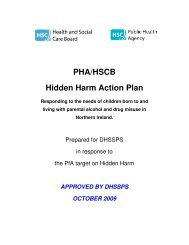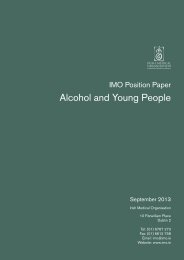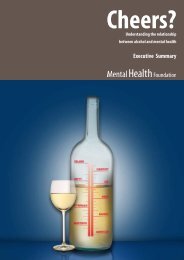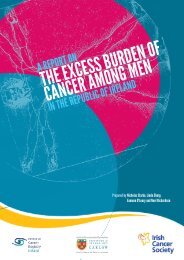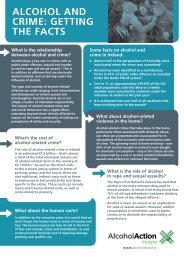Addressing the harmful use of alcohol - WHO Western Pacific Region
Addressing the harmful use of alcohol - WHO Western Pacific Region
Addressing the harmful use of alcohol - WHO Western Pacific Region
Create successful ePaper yourself
Turn your PDF publications into a flip-book with our unique Google optimized e-Paper software.
<strong>Addressing</strong> <strong>the</strong> <strong>harmful</strong> <strong>use</strong> <strong>of</strong> <strong>alcohol</strong> : A guide to developing effective <strong>alcohol</strong> legislation<br />
clear objectives and established funding mechanisms (Rehn-Mendoza 2010). The <strong>WHO</strong><br />
publication The Establishment and Use <strong>of</strong> Dedicated Taxes for Health relates to tobacco but is<br />
a <strong>use</strong>ful resource for establishing a Health Promotion Foundation (Carol 2004). In addition, <strong>the</strong><br />
International Network <strong>of</strong> Health Promotion Foundations <strong>of</strong>fers support for <strong>the</strong> development <strong>of</strong><br />
new foundations.<br />
Issues to consider<br />
Funding options<br />
Funding for health promotion or enforcement from government revenue in a consolidated<br />
account can be affected by changing priorities and competition between departments in <strong>the</strong><br />
annual budget round. Dedicated funding is more stable and may be secured in one <strong>of</strong> two<br />
ways. Tax legislation on <strong>alcohol</strong> excise duty can include provisions that set aside a percentage<br />
<strong>of</strong> <strong>the</strong> revenue for specific purposes related to <strong>alcohol</strong> control, treatment or health promotion.<br />
To maintain general government revenue at <strong>the</strong> existing level, this percentage will be an<br />
increase in <strong>the</strong> <strong>alcohol</strong> excise rate. Alternatively, separate health legislation can establish<br />
a levy on <strong>the</strong> tobacco or <strong>alcohol</strong> industry, over and above current <strong>alcohol</strong> or tobacco excise<br />
duties, for a particular purpose such as health promotion fund or agency.<br />
In several countries, <strong>the</strong> levy approach has been preferred. The funds come directly from <strong>the</strong><br />
industry concerned to <strong>the</strong> Fund or Foundation. Public debate can focus on <strong>the</strong> benefits to<br />
health, not <strong>the</strong> sensitive politics <strong>of</strong> government tax increases. It decouples <strong>the</strong> dedicated fund<br />
from any increases in <strong>alcohol</strong> (or tobacco) excise duty rates.<br />
In some countries, however, <strong>the</strong> Finance Ministry may be reluctant to allow control <strong>of</strong> any<br />
revenue to pass to ano<strong>the</strong>r department or agency in <strong>the</strong> form <strong>of</strong> a dedicated fund but it is<br />
noteworthy that <strong>the</strong> legislation establishing Thailand’s Health Promotion Foundation was<br />
proposed by <strong>the</strong> Finance Minister.<br />
In New Zealand, <strong>the</strong> legislation creating <strong>the</strong> Alcohol Advisory Council imposed a two per cent<br />
levy on <strong>alcohol</strong> sales to fund it and its activities (separate from and additional to <strong>alcohol</strong><br />
excise tax). This was raised to three per cent in 2006. Thailand has an additional levy on<br />
<strong>alcohol</strong> and tobacco that funds Thai Health, a government advocacy and health promotion<br />
agency that covers all drugs (Siwaraksa 2005). After studying <strong>the</strong> Victoria and New Zealand<br />
models, ThaiHealth was funded from levies on both tobacco and <strong>alcohol</strong>. It currently receives<br />
a third <strong>of</strong> its funding from tobacco and two thirds from <strong>alcohol</strong>. Activities include support for<br />
a widespread network <strong>of</strong> NGO organisations, specific community campaigns (e.g. no <strong>alcohol</strong><br />
during funerals) and a strong role in policy development. There is now a new proposal to set<br />
20 Return to TOC


